-

人教版新目标初中英语八年级下册It’s a nice day, isn’t it教案2篇
"Hello! Welcome to English class! Introduce yourself. Meet your new classmates." That's what the teacher says. What do you say? "Oh no!" It can be difficult talking to new people. But it can be fun, and you can make friends. How do you do it? Make small talk. Small talk is polite conversation. "Wang Nan is a great pingpang player, isn't she?" "I'd love to meet her, wouldn't you?" "It's been raining a lot, hasn't it?" Tag questions are a form of polite speech. To make small talk successfully, you should know how to make them. You should also know what topics to talk about. Try to learn this unit carefully. The next time you're in English class, you'll find out. Making small talk's easy, isn't it? (“你好!欢迎你!请做一下自我介绍。认识一下你的新同学。”通常在课上老师会这样说。你会说什么呢?“噢,不!”与陌生人谈话太困难了。但是这也很有意思,并且你还能交到朋友。你该怎么做呢?闲聊。闲聊指得是礼貌的对话。“王楠是一个很棒的乒乓球运动员,不是吗?”“我希望自己能认识她,你呢?“今年的雨水很多,不是吗?”反意疑问句是一种礼貌用语。为了使得谈话成功,你应该知道怎样去进行闲聊。你还应该知道与不同的人该谈论什么样的话题。认真的学习这个单元吧,下次在英语课上,你会发现与大家展开谈话是一件很容易的事情,不信我们来试试。)

人教版新目标初中英语八年级下册What were you doing when the UFO arrived教案2篇
(一).知识方面: 1.培养学生能运用过去进行时来描述、谈论过去某个时间正在发生的事情或动作的意识和能力,能就过去某个时间正在发生的动作做出正确的描述。 2.培养学生的想象力和角色扮演的合作能力。 3.培养学生讲述过去发生的事情经过的能力。能正确运用一般过去时来讲述故事。 (二).技能方面: 1.本单元的语言目标是Talk about past events and tell a story(谈论过去的时间和讲述一个故事),围绕这一目标,要涉及句型: What were you doing when the UFO arrived? ----I was sitting in the barber’s chair. The barber was cutting my hair. 因此必须学习standing、studying、cleaning、sleeping、cooking、making、eating、cutting、等表示地点的词,以便为上述句型提供语言材料。2.学习过去进行时的有关知识。Was/were+现在分词,是该时态的表达式。 3.在学习过程中,要区分The boy was walking down the street when the UFO landed.和While the boy was walking down the street, the UFO landed.这两种由when和while引导的状语从句的句型结构。注意它们的不同。

人教版新目标初中英语九年级上册How do you study for a test教案2篇
内容提示本单元主要内容是学会利用verb十by/with gerund表示方式方法来讨论学习英语的策略,认识自己在学习方面的长处和不足。初步了解现在完成时的结构和用法。现在完成时由助动词have/has+动词的过去分词构成,主要表示过去发生的某一动作对现在仍有影响或造成的后果,常与already,yet,just,ever,never等副词连用。教学目标一、学习目标(Language Goal) 1. Talk about how to study . 学会讨论各种学习方法和策略。2. Find out your suitable learning methods. 找出适合自己的学习方法。 二、语言结构(Language Structures) 1. Verb + by with gerund by+动名词短语 表示“通过…途径,方法” 2. How questions have引导的特殊疑问句 三、目标语言(Target Language) 1. How do you study for tests ? 你是怎样准备考试的?Well , I study by working with my classmates. 哦,我和同学们一起学习。2. Have you ever studied with a group ? 你曾经参加过学习小组吗?Yes , I have . I’ve learned a lot that way . 是的,参加过。通过这种方式我学了许多。

人教版新目标初中英语七年级下册How was your weekend教案2篇
Teaching Goal:1. General aims:Talk about recent past events2. Particular aims:A. Language Focus.Talk about recent past events and think of the past events.B. Language goalsHow was….?It was …What did …do over the weekend?C. Language structures:(1). How was your weekend? I was great. Pay attention to no form.(2). What did you do over the weekend? I played soccer. We went to the beach.D. Useful words and phrases:Words: was, did, went, beach, over, project, test, wasn’t, false, number, geography, spend, week, most, mixture, their, had, little, cook, read, saw, change, everyone, sit, sat, no, anythingPhrases: did one’s homework, played soccer, cleaned my room, went to the beach, played tennis, went to the movies, on Saturday morning, over the weekend, cook … for, what about, do some reading, have a party, talk show, go shoppingE. Grammar language:Present simple past tenseRegular and irregular verbsF. Learning strategies:Tour and holidaysG. Interdiscipinary:H. Emotion and manner:Teaching time: 5 periodsTeaching procedures:Period One教学步骤、时间 教师活动 学生活动 媒体应用Step 1Free talk 3’ Ask some questions like:Who’s on duty today?What’s the weather like? Answer and talk about something.让同学们回答下列问题1. Do you like weekend? (Let some students answer)It takes them three minutes to talk about the question.2. Why do you like weekend? (let the students answer) Most of the students like the weekend此时教师用汉语问:“在周末期间问你干了什么?这句话用英语这么回答?Let the students guess.At last the teacher give them right answer3. What did you do over the weekend?(板书、学习)

人教版新目标初中英语七年级下册Where is the post office教案2篇
Period 2 (3a----Section B 2c)Preview(Pre-task): Key points: What laAdd another information about their pen pals----their language on the cardnguage does she/he speak?She/He speaks....Does she/he have any brothers and sisters? Does she/he speak English?Preview(Pre-task): Add another information about their pen pals----their language on the cardKey points: What language does she/he speak?She/He speaks....Does she/he have any brothers and sisters? Does she/he speak English?Step 1 Revision1.Revisionand dictation of the new words 2.Revise the drills they learned yesterday.(by pairwork and grammar exercise)Step 2 Leading-inT has a conversation with one student. The conversation is following:---Do you have a pen pal?---Yes, I do.---What's your pen pal's name? ---His/Her name is....---Where is your pen pal from? ---He/She is from...---Where does he/she live? ---He/She lives in....---What language does he/she speak?He/She speaks...Write the new words on the Bb. They are following: EnglishChineseJapaneseFrenchStep 3 LearnLearn the new words with the whole class.Finish 3a with the students3b Pairwork T still does an example with one student Then the Ss practise in pairs. The example is following:--Curry Muray is my pen pal. He is from the United States.---What language does he speak?
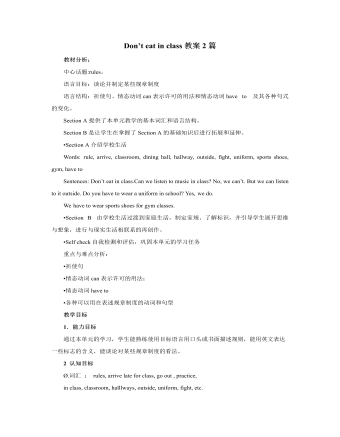
人教版新目标初中英语七年级下册Don’t eat in class教案2篇
Don’t fight. =You can’t fight. (板书,教读)教师把这些句子板书在黑板上,并请学生大声整齐地读祈使句和“can’t”句型,并让学生注意两种句型表达形式的不同和转换,“Don’t …=You can’t…”;并对学生说:These are our school rules. (板书,教读) You can’t break the school rules. Don’t break the school rules.(板书,教读)步骤3 :Practicea. T: Now, each of the students is breaking one of these rules.Please finish 1a.学生看图,完成1a的内容,检查答案并大声朗读校规。b. 听录音,完成1b,选出四位学生都违反了哪条校规;听之前,学生要读会英文名。c. 请两位学生朗读1c部分的句型;要求学生两人一组对话表演,SA扮演外校转来新生,SB告知本校校规。(学生可经过讨论,多说出他们想到的校规,不必只限于书上;教师应给予帮助)2) 第二课时(2a~4)步骤1 :warming up of revisionT: What are the rules at your school?学生使用“can”或祈使句表达各条校规;其中老师可引出“eat in the cafeteria outside”的表达。步骤2 :Practicea.T: Christina is an exchange student. She doesn’t know the rules. Let’s listen, what activities they’re talking about?学生听第一遍时,完成2a;第二遍时,完成2b;b. 请学生领读2c部分,看着2a完成的表格,理解2c活动的要求;分成小组针对2a进行问答;
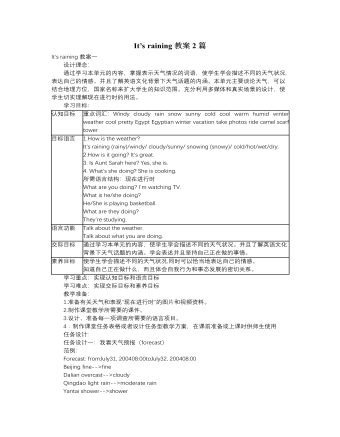
人教版新目标初中英语七年级下册It’s raining教案2篇
1 Each group choose one place to describe and what you are doing in it Choose one place, and describe what they are doing 2 Move around the room and give suggestions Talk about it and write it down 3 Ask one to show their works and act it Choose one of each group to make a report 4 Evaluate the best group and the best reporter Choose the best one Homework Ask your friends their ideal place and write about it教学反思:新课程标准中强调学生在课堂中的主体地位,在综合课中他们的主体地位就更加突出。在各个活动中给不同程度的学生不同层次的任务,让各层面的学生都有表现发挥的机会,从而产生对英语的兴趣。使用照片图片多媒体来辅助教学,效果更好。同时让了解其他国家风景,风俗的同学介绍ideal place,增加学生的背景知知识,实现跨学科交流的目的。教案点评:采用任务型教学模式,在各个活动中给不同程度的学生不同层次的任务,让各层面的学生都有表现发挥的机会,从而产生对英语的兴趣。使用照片图片多媒体来辅助教学,效果更好。让了解其他国家风景,风俗的同学介绍ideal place,增加学生的背景知识,实现跨学科交流的目的。
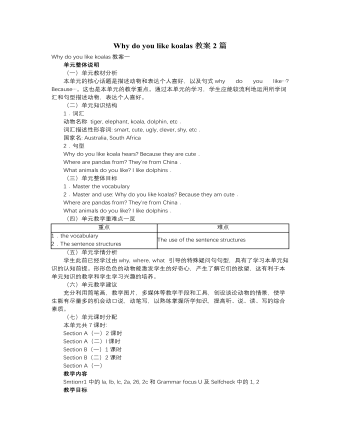
人教版新目标初中英语七年级下册Why do you like koalas教案2篇
单元整体说明(一)单元教材分析本单元的核心话题是描述动物和表达个人喜好,以及句式why do you like…? Because…。这也是本单元的教学重点。通过本单元的学习,学生应能较流利地运用所学词汇和句型描述动物,表达个人喜好。(二)单元知识结构1.词汇动物名称 tiger, elephant, koala, dolphin, etc.词汇描述性形容词: smart, cute, ugly, clever, shy, etc.国家名: Australia, South Africa2.句型Why do you like koala hears? Because they are cute.Where are pandas from? They're from China.What animals do you like? I like dolphins.(三)单元整体目标1.Master the vocabulary2.Master and use: Why do you like koalas? Because they am cute.Where are pandas from? They're from China.What animals do you like? I like dolphins.(四)单元教学重难点一览(五)单元学情分析学生此前已经学过由why, where, what 引导的特殊疑问句句型,具有了学习本单元知识的认知前提。形形色色的动物能激发学生的好奇心,产生了解它们的欲望,这有利于本单元知识的教学和学生学习兴趣的培养。
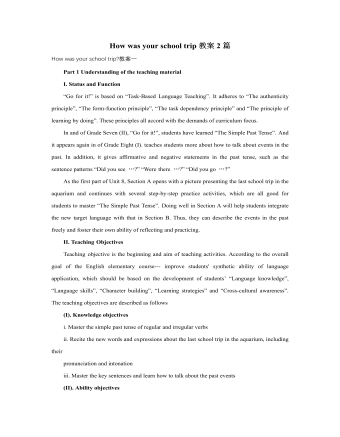
人教版新目标初中英语八年级上册How was your school trip教案2篇
“Go for it!” is based on “Task-Based Language Teaching”. It adheres to “The authenticity principle”, “The form-function principle”, “The task dependency principle” and “The principle of learning by doing”. These principles all accord with the demands of curriculum focus.In and of Grade Seven (II), “Go for it!”, students have learned “The Simple Past Tense”. And it appears again in of Grade Eight (I). teaches students more about how to talk about events in the past. In addition, it gives affirmative and negative statements in the past tense, such as the sentence patterns “Did you see …?” “Were there …?” “Did you go …?” As the first part of Unit 8, Section A opens with a picture presenting the last school trip in the aquarium and continues with several step-by-step practice activities, which are all good for students to master “The Simple Past Tense”. Doing well in Section A will help students integrate the new target language with that in Section B. Thus, they can describe the events in the past freely and foster their own ability of reflecting and practicing. II. Teaching ObjectivesTeaching objective is the beginning and aim of teaching activities. According to the overall goal of the English elementary course--- improve students' synthetic ability of language application, which should be based on the development of students’ “Language knowledge”, “Language skills”, “Character building”, “Learning strategies” and “Cross-cultural awareness”. The teaching objectives are described as follows(I). Knowledge objectivesi. Master the simple past tense of regular and irregular verbsii. Recite the new words and expressions about the last school trip in the aquarium, including their pronunciation and intonation
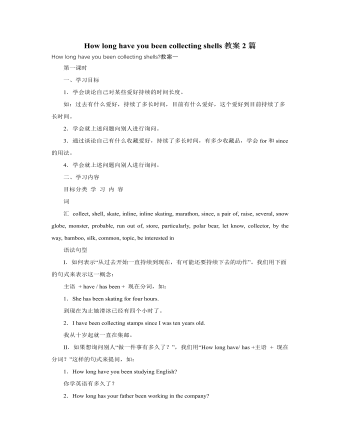
人教版新目标初中英语八年级下册How long have you been collecting shells教案2篇
Step Ⅱ Show the new words on the screen and teach the new words. Read the new words to students and ask them to repeat.Step Ⅲ 3aThis activity introduces new vocabulary and provides reading practice using the target language.In this activity first look at the four pictures.T: What can you see in the pictures?Ss: Four snow globes.T: Right. There are four snow globes in the pictures. And what are they?Ss: They are a monster, two polar bears, two penguins and a birthday cake.Write these words on the blackboard: snow globe; monster; polar bear; penguin and birthday cake. Read them to the class and ask students to repeat each one. Make sure students understand each word.Use a computer to show the E-mail message on the screen and read the message to students.Get students to read the e-mail on their own, and then draw lines connecting each snow globe and its description.Correct the answers.AnswersA line should connect each snow globe picture with the words that describe it in the letter.Step Ⅳ 3bThis activity provides writing practice using the target language.First review Activity 2a on Page 47.Then ask students to complete the message according to Activity 2a.Some partial sentences are given to students. Write about one person's collection.When students work, walk around the room checking the progress and offering help as needed.When they finish, ask some students to read their messages to the class.

人教版新目标初中英语九年级上册Teenagers should be allowed to choose their own clothes教案2篇
Step 1 Greeting Greet the class and check the homeworkStep 2 A duty report The S on duty gives a report on the rules in his home and lead in 3a “Sun Fei’s and Wu Yu’s rules” Step 3 ReadingSs read the conversation and write the two girls’ rules in the chart. Check the answers.Get Ss to read after the tape and then read aloud by themselves. Then, T explains the language points.Step 4 Pairwork 3bRole play. Use the information in chart to practice with the conversation in 3a covered. They can look at the sample conversation in the right box.Step 5 Task 2 “Who’s the best reporter?”Make a survey by asking any 5 students the questions in the chart in activity 4. Then give out a report about it. See who is the best reporter? And the best reporter will get a nice ball-pen.Step 6 Summary and homework:Write out the report in your exercise-books.Period ThreeStep 1 Greeting and a duty reportThe S gives a duty report talking about his experience of being late for school. Lead in the question “Do you ever get to school late? How often do you get to school late? Always, usually, sometimes, or never?Step 2 1a Get Ss to finish writing.Step 3 Pairwork 1b Get Ss to talk about their answers with their partners using the sample conversation in the box on the right.Step 4 Listening practice2a Lead-in: What will happen if you get to school late? What about Peter? Let’s listen to a conversation between Peter and his father. Get Ss to finish 2a (As usual, for the first time, Ss only listen.) Check the answers.

人教版新目标初中英语九年级上册Where would you like to visit教案2篇
The First PeriodⅠ.Teaching Aims and DemandsKnowledge Objects(1) Key Vocabularytiring, educational, fascinating, thrilling, peaceful, exotic, trek, jungle, take it easy, explore, historic, site(2) Target LanguageWhere would you like to go on vacation?I’d like to trek through the jungle, because I like exciting vacations.2. Ability Objects(1)Train students to talk about places they would like to visit with the target language.(2)Train students to describe vacations with different adjectives.(3)Train students' listening skill.3. Moral Object,It′s more interesting to go on vacating somewhere instead of staying at home.Ⅱ. Teaching Key Points1. Key Vocabularytiring, educational, fascinating, thrilling, peaceful, exotic, trek, jungle, take it easy, explore, historic, site2. Target LanguageTalk about different places with the target language.Ⅲ. Teaching Difficult Points1. Describe vacations with different adjectives.2. Talk about different places with the target language.Ⅳ. Teaching Methods1. Teaching by illumination2. Teaching by doing chain drills3. Teaching by pairworkⅤ. Teaching Aids1. A tape recorder2. Some pictures of different places with famous views

人教版新目标初中英语九年级下册We’re trying to save the manatees教案2篇
本单元主要围绕着有关濒临灭绝的动物这一话题,学习了应该怎样保护我们的环境,以及就某一问题展开辩论。目标提示语言目标能够运用所学知识,就某一问题展开辩论。认知目标1、复习一些语法:现在进行时、一般现在时、用used to 表示一般过去时、现在完成时、一般过去时的被动语态。2、学会表达同意和不同意。3、学会以下基本句型:We’re trying to save the manatees.Manatees eat about 100 pounds of food a day.There used to be a lot of manatees.In 1972,it was discovered that they were endangered.Some of the swamps have become polluted.情感目标了解一些濒临灭绝的动物的生活习性和濒临灭绝的原因,教育学生应该如何保护环境。教学提示充分利用多媒体等教学设备,创设与本课话题相关的情境,如各种不同种类的动物、动物园以及有关环境的画画等等。围绕着本单元的教学目标,设计一些贴近学生实际的教学任务,如让学生谈论自己最喜欢的动物,如何拯救濒危动物,如何保护环境等等。让学生根据所学知识,就动物园是否对动物有利以及其他的话题进行辩论。
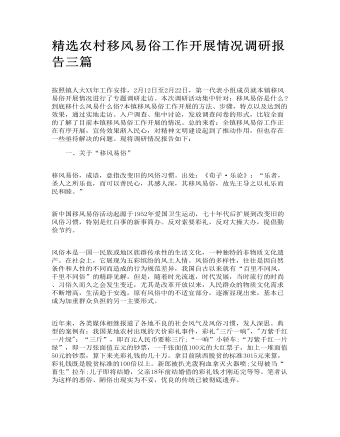
精选农村移风易俗工作开展情况调研报告三篇
一、关于“移风易俗” 移风易俗,成语,意指改变旧的风俗习惯。出处:《荀子·乐论》:“乐者,圣人之所乐也,而可以善民心,其感人深,其移风易俗,故先王导之以礼乐而民和睦。” 新中国移风易俗活动起源于1952年爱国卫生运动,七十年代后扩展到改变旧的风俗习惯,特别是红白事的新事简办。反对索要彩礼,反对大操大办,提倡勤俭节约。 风俗本是一国一民族或地区族群传承性的生活文化,一种独特的非物质文化遗产。在社会上,它展现为五彩缤纷的风土人情。风俗的多样性,往往是因自然条件和人性的不同而造成的行为规范差异,我国自古以来就有“百里不同风,千里不同俗”的精辟见解。但是,随着时光流逝,时代发展,当时流行的时尚、习俗久而久之会发生变迁,尤其是改革开放以来,人民群众的物质文化需求不断增高,生活趋于安逸,原有风俗中的不适宜部分,逐渐显现出来,基本已成为加重群众负担的另一主要形式。
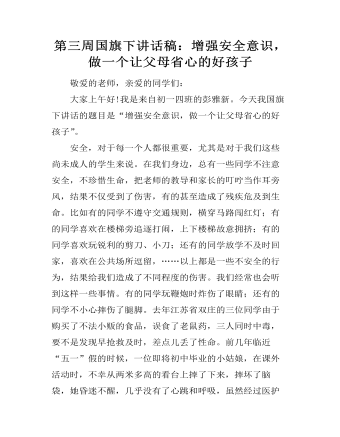
第三周国旗下讲话稿:增强安全意识,做一个让父母省心的好孩子
敬爱的老师,亲爱的同学们:大家上午好!我是来自初一四班的彭雅新。今天我国旗下讲话的题目是“增强安全意识,做一个让父母省心的好孩子”。安全,对于每一个人都很重要,尤其是对于我们这些尚未成人的学生来说。在我们身边,总有一些同学不注意安全,不珍惜生命,把老师的教导和家长的叮咛当作耳旁风,结果不仅受到了伤害,有的甚至造成了残疾危及到生命。比如有的同学不遵守交通规则,横穿马路闯红灯;有的同学喜欢在楼梯旁追逐打闹,上下楼梯故意拥挤;有的同学喜欢玩锐利的剪刀、小刀;还有的同学放学不及时回家,喜欢在公共场所逗留,……以上都是一些不安全的行为,结果给我们造成了不同程度的伤害。我们经常也会听到这样一些事情。有的同学玩鞭炮时炸伤了眼睛;还有的同学不小心摔伤了腿脚。去年江苏省双庄的三位同学由于购买了不法小贩的食品,误食了老鼠药,三人同时中毒,要不是发现早抢救及时,差点儿丢了性命。前几年临近“五一”假的时候,一位即将初中毕业的小姑娘,在课外活动时,不幸从两米多高的看台上摔了下来,摔坏了脑袋,她昏迷不醒,几乎没有了心跳和呼吸,虽然经过医护人员的全力抢救,至今也没有脱离危险。
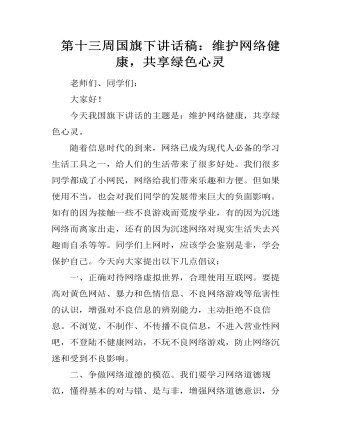
第十三周国旗下讲话稿:维护网络健康,共享绿色心灵
老师们、同学们:大家好!今天我国旗下讲话的主题是:维护网络健康,共享绿色心灵。随着信息时代的到来,网络已成为现代人必备的学习生活工具之一,给人们的生活带来了很多好处。我们很多同学都成了小网民,网络给我们带来乐趣和方便。但如果使用不当,也会对我们同学的发展带来巨大的负面影响。如有的因为接触一些不良游戏而荒废学业,有的因为沉迷网络而离家出走,还有的因为沉迷网络对现实生活失去兴趣而自杀等等。同学们上网时,应该学会鉴别是非,学会保护自己。今天向大家提出以下几点倡议:一、正确对待网络虚拟世界,合理使用互联网。要提高对黄色网站、暴力和色情信息、不良网络游戏等危害性的认识,增强对不良信息的辨别能力,主动拒绝不良信息。不浏览、不制作、不传播不良信息,不进入营业性网吧,不登陆不健康网站,不玩不良网络游戏,防止网络沉迷和受到不良影响。
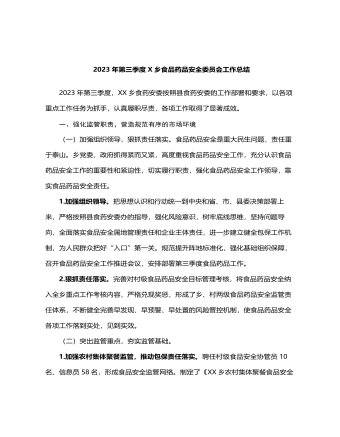
2023年第三季度X乡食品药品安全委员会工作总结
二、存在的问题我乡食品药品安全工作虽然取得了一定成绩,但与上级要求和其他兄弟乡镇相比,还有一定的差距。一是办公条件有限,执法力量薄弱,食品检测技术有待进一步提高。二是执法人员力量单薄,工作开展角度不全。三是执法办案水平不高,市场主体经营范围小,处罚力度不够大。四是部分经营户对主体责任意识不够强。三、下一步工作打算(一)推进安全监管工作,守住安全底线。一是强化食品药品安全监管。严格落实食品安全责任制,持续加大监管力度,全乡餐饮单位分类定级暨店外挂牌公示实现全覆盖;扎实开展校园食品安全守护行动,全力保障校园食品安全,防范和减少食源性疾病事件;二是加强特种设备安全风险防范,做到监管全方位、全覆盖、无盲区。加大特种设备隐患整治力度,确保实现特种设备隐患整治率、注册登记率、日常监督检查计划完成率、定期检验率均达100%。
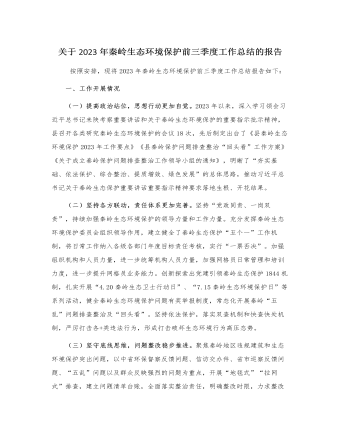
关于2023年秦岭生态环境保护前三季度工作总结的报告
二是问题整改再夯责。扎实推进各级各类反馈问题整改,切实扛起问题整改政治责任,细化整改措施,全力加快问题整改。全力完成“五乱”问题整改销号任务,建立健全“五个一”长效机制,对“五乱”问题实行零容忍,坚决扭住不放,露头就打。三是生态价值再深化。按照省市生态产品价值实现机制试点工作总体安排部署,依据《32条措施》和《重点工作任务清单》,积极谋划好全县生态产品价值实现机制试点路径,推动“我在秦岭有宝”微信小程序上线,持续开展绿色创建活动,不断挖掘提炼我县生态产品价值实现典型案例。四是督查检查再发力。要始终保持零容忍的高压态势,严格按照“双查”“快查快处”工作机制,常态化打击秦岭“五乱”行为。不定期开展明察暗访和专项督查倒逼任务落地落实,严肃查处秦岭生态环境保护问题线索,切实发挥考核“指挥棒”作用,不断加大秦岭生态环境保护领域监督执纪问责力度,切实营造风清气正的秦岭生态环境保护工作氛围。
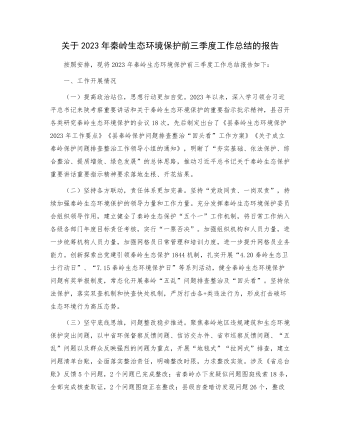
关于2023年秦岭生态环境保护前三季度工作总结的报告(1)
二是问题整改再夯责。扎实推进各级各类反馈问题整改,切实扛起问题整改政治责任,细化整改措施,全力加快问题整改。全力完成“五乱”问题整改销号任务,建立健全“五个一”长效机制,对“五乱”问题实行零容忍,坚决扭住不放,露头就打。三是生态价值再深化。按照省市生态产品价值实现机制试点工作总体安排部署,依据《32条措施》和《重点工作任务清单》,积极谋划好全县生态产品价值实现机制试点路径,推动“我在秦岭有宝”微信小程序上线,持续开展绿色创建活动,不断挖掘提炼我县生态产品价值实现典型案例。四是督查检查再发力。要始终保持零容忍的高压态势,严格按照“双查”“快查快处”工作机制,常态化打击秦岭“五乱”行为。不定期开展明察暗访和专项督查倒逼任务落地落实,严肃查处秦岭生态环境保护问题线索,切实发挥考核“指挥棒”作用,不断加大秦岭生态环境保护领域监督执纪问责力度,切实营造风清气正的秦岭生态环境保护工作氛围。

XX镇民政所、残联2024年第三季度工作开展情况工作总结
(二)着力保障和改善民生,做好社会救助工作。一是抓好城乡低保政策落实,把符合条件的困难群众全部纳入低保,做到应保尽保,并及时将低保救助金按时足额发放到低保户手中。二是抓好特困救助政策落实。将符合特困救助对象全部纳入了特困供养范围,并及时足额发放特困救助金。三是抓好临时救助政策落实,保障突发困难人员的基本生活,重点解决因病、因残和其他原因造成生活困难的家庭,着力保障和改善民生,做好社会救助工作。(三)加强XX镇敬老院和辖区内老年公寓、老年助餐点的安全生产工作,落实各项食品安全管理制度,从细微之处着手,加大安全生产常态化防处力度,做深、做细、做实老年人相关服务的安全保障工作,推进养老服务提质增效,持续提升辖区老年人的幸福感、获得感、安全感,加大安全生产排查力度,对检查中发现的安全问题责令其限时整改。





